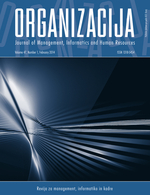Basic Principles of Cost Optimization of Construction Project Time Schedules
Abstract
The cost effective project realization represents one of the fundamental goals of the time scheduling in construction. The cost effective time schedule for the construction project is commonly achieved after performed analysis of the network diagram structure, activity durations, project costs, required resources and with trial-and-error testing of different alternative solutions. The minimum total cost time schedule of the construction project is usually selected from the obtained alternative solutions. The analytical approach to the time scheduling is widely used in construction on account of its simple execution and acceptable results. On the other hand, a significantly better results can be obtained by the mathematical programming-based cost optimization of time schedules. In this way, the aim of this paper is to bring forward the basic principles of the cost optimization of time schedules to the wider expert community. The paper presents the two basic methods for the model formulation of the project time scheduling optimization problems, i.e. the arrow diagramming method and the precedence diagramming method. Both methods were used for basic cost optimization model formulations of the project time scheduling optimization problem. An example from the literature was presented at the of the paper to demonstrate the applicability of optimization models for the cost optimization of construction project time schedules.
Refbacks
- There are currently no refbacks.

